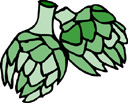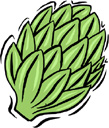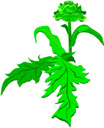
Globe artichokes are a vegetable.
- botanical information
- origin
- history
- part used
- nutritional information
- storage
- Goddesses and deities
botanical information:
Botanical name: Cynara cardunculus, also called Cynara scolymus
Common name: artichoke, globe artichoke
Use the botanical name when ordering seeds (bulbs, etc.) or when looking up information in the library. Common names vary by nation, culture, and region, and sometimes the same common name is applied to different plants.
French name: artichaut
Italian name: articiocco
Family: Asteraceae (aster, daisy, or sunflower family)
Kind: Perennial Thistle.
Height: 1-1/2 to 2 meters tall
origin:
Origin: southern Europe, Mediterranean, Sicily, Egypt, Canary Islands. Possibly orignally from the Maghreb in North Africa (artichokes still grow wild there)

history:
History: The Greeks grew artichokes in Sicily. The Greeks called globe artichokes kaktos.
History: Globe artichoke seeds discovered in excavation of Mons Claudianus in Egypt, from the Roman period. The Romans called artichokes carduus.
History: Globe artichokes were grown in the Maghreb of North Africa by the Muslims. The Arabs called globe artichokes Ardi-Shoki, meaning “ground thorny”. The later Arabic name al-kharshuf was the source of the plant name in most European languages.
History: Globe artichokes were grown in Naples by the middle 9th century.
part used:
|
Part Used (healing): Dried leaf, rather than the flowering buds eaten as a vegetable. Information courtesy of Mountain Rose Herbs |
nutritional information:
Eat at least one serving of artichoke per month, taking in account the season and local availability. For more information on healthy diet, see Goddess Diet Plan.
Artichokes are an alkaline-producing food (measured by the ash content resulting from laboratory titration.
Artichokes are a source of protein.
Artichokes help keep the liver clean and healthy.
Artichokes are a food that increases sexual energy and enhances fertility.
nutritional value per 100 grams:
- Calories: 40-50 calories
- Water: 85%
- Proteins: 3 grams
- Fat: 0.29 grams
- high in Vitamin A
- high in Vitamin B
- high in phosphorus
- high in minerals
storage:
Storage: Eat artichokes within two days of purchase.

deities associated with artichoke:
Myth: Jupiter (or Zeus) fell in love with Cynara, a beautiful girl with ash blonde hair. Cynaraa rejected Jupiter (or Zeus), so he turned her into the first artichoke (which had the Roman name Cynara, leading to the modern botanical name Cynara scolymus).


next food
herbs |
||
| previous plant |
next plant |













